Can you imagine that the data that is already in electronic medical records could anticipate hypoglycemia before it occurs?Or predict whether someone is at risk of developing retinopathy or diabetic nephropathy?What seems like the future is already possible, and is closer than we believe thanks to artificial intelligence (AI).
📊 In Colombia, a group of researchers has shown that applying AI tools to the analysis of electronic medical records (HCE), hidden risks can be detected and more successful and personalized clinical decisions.This has very important implications for all people with diabetes - and live with type 1, type 2, or even at risk of developing it.
What have they achieved?
👉 In their first study, they analyzed more than 146,000 medical notes written by health professionals, using natural language processing (PLN).They managed to identify with an 87% precision episodes of hypoglycemia that often go unnoticed in traditional systems.
👉 In the second study, they went further: they combined clinical notes with treatments data, adherence to medicines and support networks of the patient (family, community and health system).With all that, they created predictive models capable of anticipating whether a person can maintain their glucose in the range and if you have a risk of developing serious complications such as neuropathy or retinopathy.
🩺 The message is clear: diabetes cannot be addressed only from numbers or medications.The context, accompaniment, education and access are essential factors.And all that leaves a mark on our medical records, although it is often saved in "unstructured" notes that no one looks ... except AI.
What does this mean for us as a community?
💡 We have a unique opportunity.People with diabetes constantly generate data: measurements, controls, treatments, habits.If these data are interpreted well, they can help us not only to control the disease, but to prevent complications before they appear.
💬 In addition, it reminds us why it is so important to tell our stories, share our experiences and be part of a community.Because many times, what helps most in the numbers ... but in what we live day by day.
🤖 Artificial intelligence is a powerful, but the most valuable tool is still the community.AI can help us provide for complications ... But it is we, together, who can prevent loneliness, abandonment or lack of information.
💬 What do you think?
Would you like to be promoted to tools such as these in diabetes?
Do you think that your medical records really reflect what your day to day with diabetes is?
I read you in the comments!


